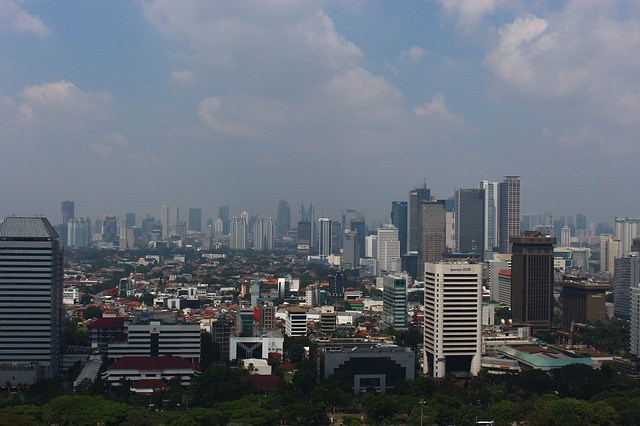Are you considering a move to Jakarta?
With a population in the city alone of over 9 million people, the Indonesian capital is a busy and thriving hub.
In this guide we’ll take a look at the good, the bad, and the ugly of a city deemed one of the fastest improving expat destinations in the world.
A Guide to Moving to Jakarta From The UK

Moving to Jakarta: Our guide walks you through healthcare, expat communities and if Jakarta is safe for expats
There are a few things to keep in mind before moving to Jakarta.
First things first, it’s important to appreciate that this is a big city.
Sprawling would be the correct term.
The metropolitan area extends to 6,615 sq. miles and is home to over 30 million inhabitants.
Such a dense population makes traffic a nightmare and we can’t think of many worse places for setting up a home and then having to commute.
That said, if you choose a good location, close to work, schools and a community, then the higher standard of living makes Jakarta an excellent choice for expat life.
How is Expat Life in Jakarta?
The island of Java upon which the city is situated is the 13th largest island in the world and is formed of mountain ranges which include active and dormant volcanoes, tropical rainforests and stunning beaches. The country still relies on its agricultural culture with coffee and rice being farmed intensively but also earns a good deal from tourism and, more recently, from its capital, Jakarta.
Jakarta is Indonesia’s economic and political hub and dominates the regions wealth and global activities.
The city is responsible for a GDP of around $148.5 billion and is spread across many sectors from communication and construction to finance and manufacturing. In 2014 the economy was ranked 34th in a study of 200 global cities for economic growth which is rising at a rate faster than Beijing or Bangkok: two other popular Asian expat destinations.
The jobs market is active and many companies can offer expats a good deal on their remuneration packages to include accommodation, insurance and access to schools.
Whilst the island’s official language is Indonesian, the fact that Jakarta attracts so many migrants means that English has fast become the most common means of communication. English newspapers, television channels, signs and information can be found throughout the city and English speakers find the city very easy to navigate and get by in.
The city is a melting pot of traditional Indonesian cultures as well as having Asian, Middle-Eastern and Western influences. In common with other alpha cities in the region, Jakarta has an international appeal and caters well for both East and West.
For both tourists and expats, there is plenty to do:
Most Popular British Expat Communities
With the appeal of living in such a beautiful location coupled with higher standards of living it is little wonder that Jakarta is becoming increasingly popular with expats. As a result, the community is very established and offers clubs and community events ranging from choirs and social groups to local heritage clubs, sports activitives and study groups.
Most expats rent in the suburbs as purchasing property is governed by tight local laws and can be expensive, particularly if you require a mortgage. Homes usually come with gardens and pools and the areas are rich with community life as well as family friendly spaces. Two popular locations for Brits are Pondok Indah and Kemang.
Cost of Living
As you would expect, the cost of living in Jakarta is lower compared to that of any major city in the UK. Take this cost of living comparison between Jakarta, Birmingham and London as an example:
| Indices | Jakarta | Birmingham | London |
| 3 Course Meal for 2 | £14.33 | £40.00 | £55.00 |
| Taxi 1km | £0.23 | £1.90 | £3.73 |
| Monthly Utilities | £71.35 | £135.12 | £150.19 |
| Rent (1 Bed, City) | £441.37 | £700.88 | £1,674.89 |
| Pair of Jeans (501’s) | £43.12 | £53.75 | £63.30 |
| Cinema Ticket | £2.92 | £8.00 | £12.00 |
| Pack of Cigarettes | £1.17 | £9.00 | £9.50 |
| Bottle of Wine | £23.39 | £6.99 | £8.00 |
However, the average disposable monthly income in Jakarta is significantly lower than that of the UK and, if you are looking to buy property then the annual rate of interest charged on mortgages is comparatively much higher.
| Indices | Jakarta | Birmingham | London |
| Ave Net Disposable Income (Monthly) | £494.88 | £1,462.67 | £2,059.07 |
| Annual Mortgage Rate | 10.70% | 3.62% | 3.31% |
In short, if you are moving to Jakarta with a good pension or a source of income that is dereived outside Indonesia, then you will live very handsomely here.
If you don’t have such a luxury, the local jobs economy will offset the much lower cost of living.
Healthcare
Unlike the UK, Indonesia has no public healthcare system and there is no national medical insurance.
The public facilities are not up to Western standards so expats normally use the private clinics and practices which can be quite costly.
For routine check-ups and minor injuries, the public facilities are adequate but you are expected to pay cash. Though not essential, it is highly recommend that expats arrange a comprehensive health insurance policy that can reimburse the cost of healthcare payments in Indonesia.
If you have the money and can afford the extra time, you can access a higher standard of care in Singapore. This is something we’d strongly recommend for any expat who can afford it.
Education
For those who are looking to relocate with family and trying to assess the standards of education, you can rest assured that Jakarta is served by several high quality international schools, including the British International School in Bintaro Sektor 9.
However, the Australian and Jakarta International Schools are both equally good.
The decision on schooling is usually made on the proximity to the family home as traffic is very poor in the city so commutability is an important factor.
Climate
The city has a year round and temperate climate which averages at 27oC, maximums of 33 in September/October and minimums of 23 in July/August.
It can rain quite a bit in Jakarta; in January you can expect 19-20 days of rain or 300-350mm. In the dry season of July and August this can be as little as 50mm in 4-5 days.
Is Jakarta Safe for Expats?
Crime in Jakarta, as measured on the Global Crime Index, is comparable to other major capital cities such as London.
Crime levels in Indonesia generally are moderate and are average for the Asian region, ranking better than Thailand, Vietnam and Malaysia.
The biggest dangers in the city are from the traffic (both in terms of dangerous driving and pollution) and the drinking water. Though most authorities say it is safe to use, it is not.
Is terrorism a threat in Jakarta?
The UK foreign office has the latest travel information for any Brits passing through (or living) in Jakarta.
At the time of writing, this travel advice applied to Indonesia:
There is a high threat from terrorism. Terrorist groups continue to plan attacks and have the capacity and intent to carry out these attacks at anytime and anywhere in the country. Types of attacks have included suicide bombing and small-arms fire, targeting public and crowded places.
It should be said, however, that the severest warnings are given for Aceh, Central Sulawesi Province (Palu, Poso and Tentena), Maluku Province (especially Ambon), Papua and West Papua Province. Jakarta is seen as a lower risk destination.
To answer, is Jakarta safe for expats?
Is anywhere safe for expats?
These are choices that expats confront every day, with many living their entire lives without confronting a single threat abroad — that includes in Jakarta.
Despite the elevated security concerns, this hasn’t stopped Jakarta from turning heads as one of the fastest growing expat destinations in Asia.
Have you already moved to Jakarta? Are you planning a move to Indonesia soon?
What advice would you give to other readers?
Let us know your thoughts and comments below.




